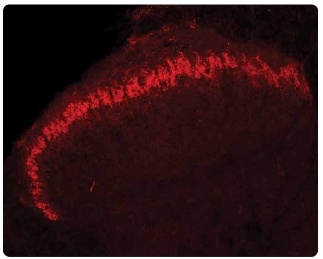Acpp (Pain System Marker) Chicken Polyclonal Antibody
CAT#: AP31817PU-N
Acpp (Pain System Marker) chicken polyclonal antibody, Aff - Purified
Other products for "Acpp"
Specifications
| Product Data | |
| Applications | IF, IHC |
| Recommended Dilution | Immunocytochemistry. Immunohistochemistry (1/500-1/1000). Quality Control: Antibodies were analyzed using immunohistochemistry with tissue sections through a 10%-formalin fixed adult Mouse. Sections were examined for PAP-positive dorsal root ganglion sensory neurons. Fluorescein-labeled Goat anti-Chicken IgY (1/500 dilution, Cat.-No AP31795FC-N) used as the secondary reagent. |
| Reactivities | Mouse |
| Host | Chicken |
| Isotype | IgY |
| Clonality | Polyclonal |
| Immunogen | Recombinant Mouse PAP protein was expressed using a baculoviral-delivery system. Preparation: After repeated injections, immune eggs were collected from laying hens, from which IgY antibody were prepared (“anti-PAP IgY fraction”). Some of this antibody was further purified using an agarose matrix to which the PAP protein was convalently attached (“Affinity-purified anti-PAP”). The final preparation in the accompanying vial contains 10 mg/ml of the “anti-PAP IgY fraction” supplemented with 20 mg/ml of the “affinity-purified anti-PAP” plus 50% (v/v) Glycerol (to prevent freezing at –20°C). Finally, this antibody preparation was filter-sterilized (0.45 mm) and 200 µl aliquots prepared. |
| Specificity | Recognizes Mouse Prostatic Acid Phosphatase (PAP). |
| Formulation | 10mM PBS, pH 7.2 containing 1% BSA as stabilizer and 0.02% Sodium Azide as preservative. State: Aff - Purified State: Liquid purified (filter sterilized) IgY fraction. |
| Concentration | lot specific |
| Purification | Affinity Chromatography using a peptide column. |
| Conjugation | Unconjugated |
| Storage | Store the antibody undiluted in the dark at 2-8°C. |
| Stability | Shelf life: one year from despatch. |
| Gene Name | acid phosphatase, prostate |
| Database Link | |
| Background | Mouse PAP is a 43,698 dalton protein (381 amino acids; NCBI accession numberAAF23171) associated with prostatic cancer cells, as well as primary afferent sensory neurons involved in the pain pathway. This protein is an enzyme that dephosphorylates adenosine monophosphate (AMP) in the dorsal horn gray matter of the spinal cord, generating free adenosine. Injections of PAP into the dorsal horn of experimental mice has been shown to decrease pain perception by acting in an antinociceptive, antihyperalgesic, and antiallodynic fashion. |
| Synonyms | Prostate acid phosphatase, PAP, ACP3, PSAP |
| Reference Data | |
Documents
| Product Manuals |
| FAQs |
| SDS |
{0} Product Review(s)
0 Product Review(s)
Submit review
Be the first one to submit a review
Product Citations
*Delivery time may vary from web posted schedule. Occasional delays may occur due to unforeseen
complexities in the preparation of your product. International customers may expect an additional 1-2 weeks
in shipping.






























































































































































































































































 Germany
Germany
 Japan
Japan
 United Kingdom
United Kingdom
 China
China



